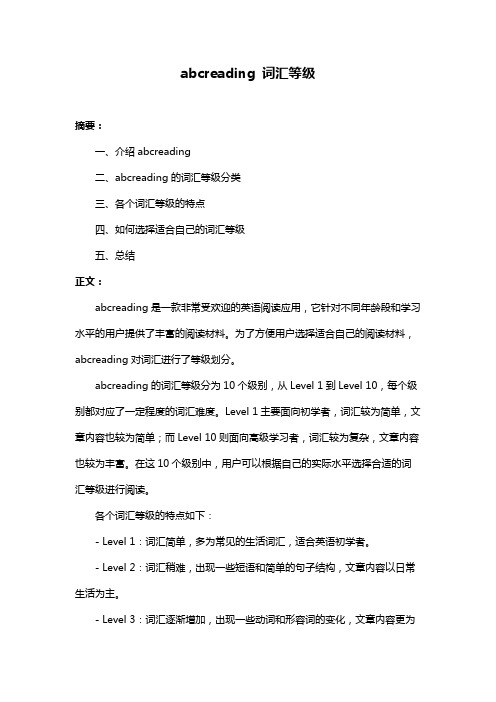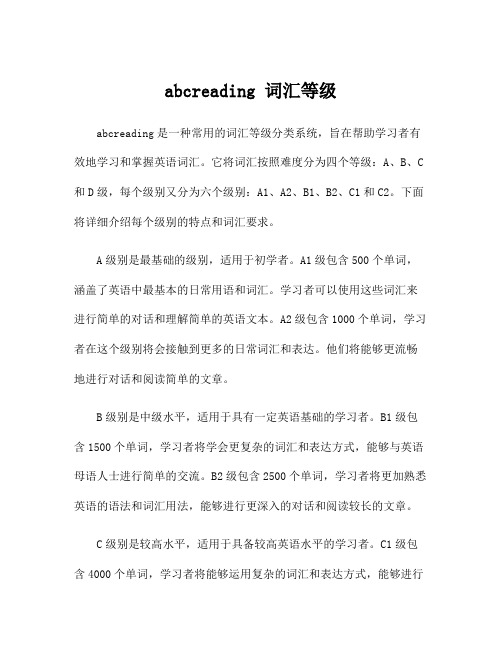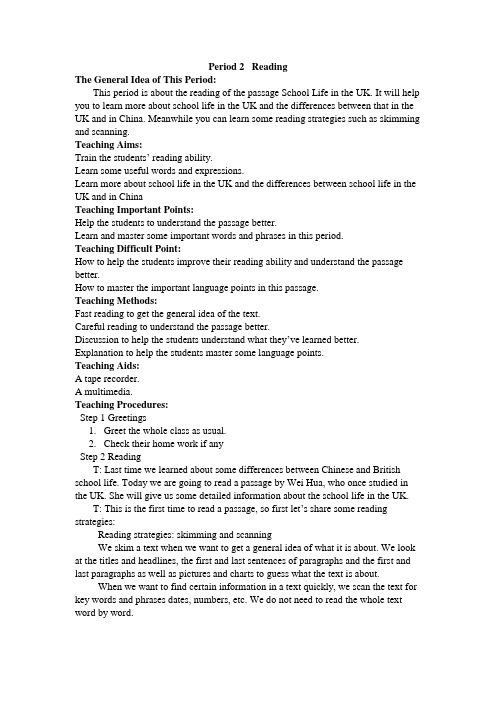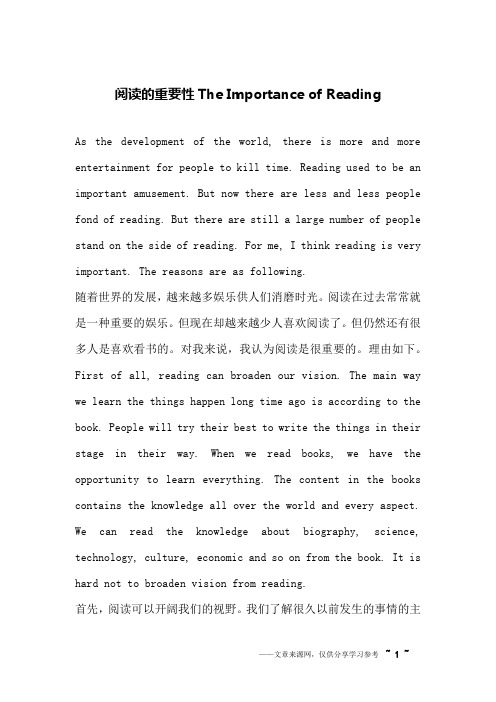Reading B & listening of Unit 1, 7B
abcreading 词汇等级

abcreading 词汇等级摘要:一、介绍abcreading二、abcreading的词汇等级分类三、各个词汇等级的特点四、如何选择适合自己的词汇等级五、总结正文:abcreading是一款非常受欢迎的英语阅读应用,它针对不同年龄段和学习水平的用户提供了丰富的阅读材料。
为了方便用户选择适合自己的阅读材料,abcreading对词汇进行了等级划分。
abcreading的词汇等级分为10个级别,从Level 1到Level 10,每个级别都对应了一定程度的词汇难度。
Level 1主要面向初学者,词汇较为简单,文章内容也较为简单;而Level 10则面向高级学习者,词汇较为复杂,文章内容也较为丰富。
在这10个级别中,用户可以根据自己的实际水平选择合适的词汇等级进行阅读。
各个词汇等级的特点如下:- Level 1:词汇简单,多为常见的生活词汇,适合英语初学者。
- Level 2:词汇稍难,出现一些短语和简单的句子结构,文章内容以日常生活为主。
- Level 3:词汇逐渐增加,出现一些动词和形容词的变化,文章内容更为丰富。
- Level 4:词汇进一步增加,出现一些较为复杂的句子结构,文章内容更为多样化。
- Level 5:词汇难度较高,出现一些专业词汇和固定搭配,文章内容涉及社会、科技等领域。
- Level 6:词汇更加丰富,出现一些高级词汇和短语,文章内容更为深入。
- Level 7:词汇难度较大,出现较多的固定搭配和习语,文章内容广泛涉及各类话题。
- Level 8:词汇非常丰富,出现大量的习语和固定搭配,文章结构复杂,内容深刻。
- Level 9:词汇难度极高,几乎涵盖了所有的英语词汇和短语,文章内容丰富且具有深度。
- Level 10:词汇最为复杂,包括大量的专业词汇和高级短语,文章内容极为丰富,涉及各类深度话题。
在选择适合自己的词汇等级时,用户可以先进行一个简单的词汇测试,了解自己的实际水平。
reading 英语作文

reading 英语作文Title: The Importance of Reading in English Composition。
In today's globalized world, the ability to communicate effectively in English has become increasingly crucial. Among the various skills required for proficiency in English, reading stands out as a fundamental pillar. Notonly does reading enhance language proficiency, but it also fosters critical thinking, expands vocabulary, and provides insights into different cultures and perspectives. In this essay, we will delve into the significance of reading in English composition.First and foremost, reading is paramount in improving language proficiency. By exposing oneself to a wide rangeof texts, one can enhance comprehension skills and developa deeper understanding of grammar and syntax. Through continuous exposure to well-written English literature, learners can internalize language patterns and structures, which in turn, aids in constructing coherent and articulatesentences in their own compositions.Moreover, reading serves as a catalyst for critical thinking. Engaging with diverse texts enables readers to analyze information, evaluate arguments, and form independent opinions. This skill is indispensable in English composition, where students are often required to express their thoughts persuasively and support their arguments with evidence. By honing their critical thinking skills through reading, students can produce more compelling and insightful compositions.Furthermore, reading expands vocabulary repertoire. Exposure to a variety of texts exposes readers to new words and phrases, thereby enriching their lexicon. A broad vocabulary not only enhances one's ability to express ideas accurately but also adds nuance and depth to their writing. Additionally, encountering words in different contexts through reading helps reinforce their meaning and usage, making them more likely to be retained in long-term memory.Additionally, reading provides valuable insights intodifferent cultures and perspectives. Literature serves as a window to the world, allowing readers to explore diverse experiences, beliefs, and traditions. Exposure to multicultural literature not only promotes empathy and understanding but also broadens one's worldview. In English composition, this cross-cultural awareness can inspire students to incorporate diverse perspectives into their writing, thereby fostering inclusivity and cultural appreciation.In conclusion, reading plays a pivotal role in English composition by enhancing language proficiency, fostering critical thinking, expanding vocabulary, and promoting cross-cultural understanding. As such, educators should emphasize the importance of reading in language learning and provide students with ample opportunities to engage with a variety of texts. By cultivating a love for reading, students can unlock the full potential of their writing abilities and become proficient communicators in English.。
abcreading 词汇等级

abcreading 词汇等级abcreading是一种常用的词汇等级分类系统,旨在帮助学习者有效地学习和掌握英语词汇。
它将词汇按照难度分为四个等级:A、B、C 和D级,每个级别又分为六个级别:A1、A2、B1、B2、C1和C2。
下面将详细介绍每个级别的特点和词汇要求。
A级别是最基础的级别,适用于初学者。
A1级包含500个单词,涵盖了英语中最基本的日常用语和词汇。
学习者可以使用这些词汇来进行简单的对话和理解简单的英语文本。
A2级包含1000个单词,学习者在这个级别将会接触到更多的日常词汇和表达。
他们将能够更流畅地进行对话和阅读简单的文章。
B级别是中级水平,适用于具有一定英语基础的学习者。
B1级包含1500个单词,学习者将学会更复杂的词汇和表达方式,能够与英语母语人士进行简单的交流。
B2级包含2500个单词,学习者将更加熟悉英语的语法和词汇用法,能够进行更深入的对话和阅读较长的文章。
C级别是较高水平,适用于具备较高英语水平的学习者。
C1级包含4000个单词,学习者将能够运用复杂的词汇和表达方式,能够进行精确的交流和理解较难的文章。
C2级包含8000个单词,学习者在这个级别已经接近于英语母语水平,能够流利地进行任何形式的交流和阅读各种类型的文章。
D级别是最高级别,适用于具备接近英语母语水平的学习者。
该级别包含10000个单词,学习者已经非常熟练地运用英语,并能够流利地进行各种复杂的交流和理解各种难度的文章。
abcreading词汇等级系统的好处在于它明确了学习者在不同水平上需要掌握的词汇量和技能。
通过有针对性地学习和练习每个级别的词汇,学习者能够逐步提高英语水平,并更有效地使用英语进行交流和理解。
此外,abcreading还提供了相关的词汇测试和学习资源,方便学习者自主学习和评估自己的进步。
总之,abcreading词汇等级系统是一种实用的分类方法,帮助学习者有效地学习和掌握英语词汇。
通过逐步提高词汇量和理解能力,学习者能够不断提升自己的英语水平,更自信地应对各种语言交流和理解的挑战。
reading教案

Period 2 ReadingThe General Idea of This Period:This period is about the reading of the passage School Life in the UK. It will help you to learn more about school life in the UK and the differences between that in the UK and in China. Meanwhile you can learn some reading strategies such as skimming and scanning.Teaching Aims:Train the students’ reading ability.Learn some useful words and expressions.Learn more about school life in the UK and the differences between school life in the UK and in ChinaTeaching Important Points:Help the students to understand the passage better.Learn and master some important words and phrases in this period.Teaching Difficult Point:How to help the students improve their reading ability and understand the passage better.How to master the important language points in this passage.Teaching Methods:Fast reading to get the general idea of the text.Careful reading to understand the passage better.Discussion to help the students understand what they’ve learned better. Explanation to help the students master some language points.Teaching Aids:A tape recorder.A multimedia.Teaching Procedures:Step 1 Greetings1.Greet the whole class as usual.2.Check their home work if anyStep 2 ReadingT: Last time we learned about some differences between Chinese and British school life. Today we are going to read a passage by Wei Hua, who once studied in the UK. She will give us some detailed information about the school life in the UK.T: This is the first time to read a passage, so first let’s share some reading strategies:Reading strategies: skimming and scanningWe skim a text when we want to get a general idea of what it is about. We look at the titles and headlines, the first and last sentences of paragraphs and the first and last paragraphs as well as pictures and charts to guess what the text is about.When we want to find certain information in a text quickly, we scan the text for key words and phrases dates, numbers, etc. We do not need to read the whole text word by word.T: Now let’s skim the text quickly and answer these questions. Hand up when you get the answers.(T show the questions on the screen.)1. How long did Wei Hua stay in Britain?2. What was the name of Wei Hua’s class teacher?3.What did Wei Hua make in her woodwork class?Suggested answers:1.For one year.2.Mr Heywood.3. A small table.T: Now let’s read the passage again carefully to check the answers. Underlinenew words in the text. Meanwhile, some more questions are waiting for you.(First go through the questions so that they know what to find out. Give them a chance to discuss with their partners if they want)1.What time do British Schools usually begin?2.What time do they usually end?3.On average, how many students are there in a class in the UK?4.Why did Wei Hua find her homework difficult at the beginning of herstudy in the UK?5.On Tuesdays, what did Wei Hua do in evening?6.What do British students usually eat after their main meal?7.Which British city did Wei Hua go to?(Write down the new words the students have just listed.)(T may begin with the T/F questions orally and this is also a good time to test their listening abilities as well as their comprehension of the text.)T: First some true or false questions. If it is false, please try to correct it.1.Wei Hua likes the school hours in the UK.2.Chinese schools encourage students to work hard.3.Wei Hua ‘s favorite teacher was Miss Burke.4.British students have fixed classroom and classmates.5.British students can only study two languages: English and French.6.British students eat a lot of fruit.7.Wei Hua enjoyed playing football.Suggested answers:1. 9 a.m2. 3:39 p.m3. About 294. Because all the homework was in English.5. She had an extra French class on Tuesday evening.6. Desserts.7. Manchester. ( You may refer to football ot the football team there. )( You may have some links on the screen when you want to explain those useful expressions , or just explain those on the Bb listed by the students . )Language points :1.experiencen. [ U] He is an old teacher with much experience.c.f. He is an experienced teacher.n. [C] My grandfather likes to tell us about his wonderful experiences in the war time.v. During the war time , my grandfather experienced a hard time .2. as : since : becauseI could get up an hour later than usual as schools in China begin before 8 a. m .I felt lucky as all my teachers were very helpful .My English improved a lot as I used English every day .Cooking was really fun as I learned how to buy , prepare and cook food .3sound link-v.The music sounds so pleasant .That sounds a good idea .I hope I don’t sound as if I’m criticizing you .It sounded like a train going under my house .4.averagen. The average of 4, 5 and 9 is 6.These marks are well above / below average .On (the ) average.We fail one student per year on average .Adj. The average age of the students is 16 in our class .Rainfall is about average for the time of year .v. This car averages 40 miles to the gallon .Meals average out at $ 10 per head .5.attend : go to6.earn : get something because you have done something good.7.challenging : difficult in an interesting way that tests your ability8.extra : more than usual9.prepare : make something ready10.drop : give up11.desserts : sweet food eaten at the end of a meal .12.Present attributive clauses and illustrate them to the students:I sat next to a girl whose name was Diane .Step 3 Listening and ConsolidationT:Now Let’s listen to the tape. You may follow it while listening,and please pay attention to your pronunciation.(The teacher plays the tape for the students to listen. After that the teacher gives the students a few minutes to read aloud the passage.Meanwhile,the teacher asks the students to try to remember some details.)T:Please turn to Page 5.Let’s do Exercise E. Complete the letter to Wei Hua using the words below.Suggested answers:1.experiences2.literature3.desserts4.headmaster5.different6.life7.preparingStep 4 DiscussionT:Now you’ve known much about Wei Hua’s school life in the UK.From the text we know that they have a variety of subjects to choose from.You may be quite puzzled whether it is necessary for senior students to learn some of them,such as so many languages and woodwork. Here let’s have a discussion:Should students learn more languages? Why or why not?What subjects would you like to take if you could choose? Why?T:Use the conwersation below as an example:A:What subjects do you like best and least?B:I really enjoy Woodwork and Art classes,because I like making things,but I ‘m not very good at History.A:I like English and Chinese best.Do you think we should learn more foreign languages?Perhaps we should learn….Step5 Summary and HomeworkT:Today we’ve learned a text about Wei Hua’s experience in the UK.First we learned some reading strategies:skimming and scanning. Master these and put them into use in future while reading. Through reading we know there are many differences both in the timetable and in the curriculum.Read the passage after class and get familiar with these language points.Have a further discussion with your partners about the topic in Part F.。
Reading Skills 读的技能

Reading Skills 读的技能、语篇类型和语篇题材范围(1)Reading Skills 读的技能I. Skimming to obtain a general impression 略读获得总体印象2.Scanning for specific information 快速查找特定信息3.Guessing unknown vocabulary 猜测生词词义4. Distinguishing 辨认重要事实的能力5.Making reference 判断指代关系6. Making prediction 进行预测7.Drawing logical conclusion 得出合乎逻辑的结论8.Making sounding judgement 作出正确判断9.Making accurate inference 作出准确推断10. Making generalization 进行概括(2)Text types for reading 读的语篇类型1)stories,tales,fables2)accounts of experiences3)news, weather reports4)personal and business letters5)signs, tables,forms, questionnaires6)programs,timetables,schedules,directories7)notices, bulletins, advertisements8)language textbooks,grammars9)reference books10) tables of contents, indexes11)catalogues, filing cards12)guidebooks13)instruction manualsI4)newspaper and magazine articles15)essays,commentaries,editorials(3)Text Areas 语篇题材范围I. Day-to-day life 日常生活2.People, social life and culture 民族、社会生活与文化3. Art and literature 艺术与文学4.Economic and trade 经济与贸易5. Social and sciences 社会科学6.Natural sciences and technology 自然科学与技术。
阅读的重要性The Importance of Reading _英语作文

要方式是通过阅读。人们用他们自己的方式尽自己最大的努力写关于 他们那个年代的事情。我们看书的时候,我们才有机会了解到一切。 书中的内容包含知识的方方面面。通过书籍我们可以了解到关于传记, 科学,技术,文化,经济等方面的知识。从阅读中,我们的视野很难 不被拓宽。 Secondly, reading can cultivate our taste. I am sure that reading some elegant sentence or the beautiful things described in the book will make us feel relax and comfortable. And we all know that the more knowledge a person has, the better-behaved he will be. I think this is the charming of reading. If there are more people like reading, the world will become more civilized. 其次,阅读可以陶冶我们的情操。我相信阅读一些优美的句子或者书 中描述的美丽东西会使我们感到放松和舒适。我们都知道一个人拥有 的知识越多,那个人就会表现得越好。我觉得这就是阅读的魅力。如 果有更多的人喜欢阅读,这个世界会变得更加文明。 The importance mentioned above just a part of reading. It has so many advantages that I can’t list all in a short time. It is irreplaceable in human beings’ life. 上面所提到的重要性只是其中一部分。阅读有很多的优点,在短时间 内我都不能一一列举我不能列举。它在人类的生活中是不可替代的。
Reading
16:27
细节题
WH设问
(when,where,who,what,how,why)
是非题
16:27
词义猜测型
16:27
16:27
positive 积极的,肯定的 negative 消极的,否定的
approval 赞成的
disapproval 不赞成的
objective 客观的
subjective 主观的
optimistic 乐观的
pessimistic 悲观的
indifferent 漠不关心的 reserved 保留意见的
up late, hurried to the office,worked until four,
went to the store,cooked dinner and washed
clothes.I did so many things that I was
certainly very tired.
16:27
If I were a boy again,I would practise perseverance more often,and never give up a thing because it was hard or inconvenient.If we want light,we must conquer darkness.Perseverance can sometimes equal genius in its results.“There are only two creatures,”says a proverb;“who can surmount the pyramids-the eagle and the snail.”
pre-reading,while-reading,post-reading
pre-reading,while-reading,post-reading讲解
"Pre-reading," "While-reading," 和"Post-reading" 是阅读教学中常用的三个阶段,用于引导学生在阅读文本前、阅读中和阅读后进行不同类型的活动和思考。
这三个阶段的目的是提高学生的阅读理解能力,激发学生的兴趣,促使他们更深入地理解和分析文本。
1. Pre-reading(阅读前):
-目的:激发学生对文本的兴趣,建立阅读的背景知识。
-活动:提出问题、进行讨论、观察标题、浏览段落开头等。
这有助于激发学生的好奇心,使他们在开始阅读前对文本内容有一些预期。
2. While-reading(阅读中):
-目的:引导学生理解文本的主旨,关键细节和语言结构。
-活动:提问、做笔记、分析图表、进行小组讨论等。
这一阶段的活动有助于学生主动参与阅读过程,深化对文本的理解,培养阅读技能。
3. Post-reading(阅读后):
-目的:引导学生深入思考文本的主题、结构、语言运用,提高批判性思维。
-活动:书写读后感、小组分享、展开讨论、提出问题等。
这一阶段的活动有助于巩固学生对文本的理解,培养他们的批判性思维和写作能力。
这三个阶段可以根据不同的教学目标和文本类型进行灵活调整。
通过这样的分阶段教学,教师能够更全面地指导学生进行阅读,帮助他们逐步提高阅读理解水平,培养批判性思维,同时增进对文学作品的欣赏和理解。
雅思口语Part1范文:Reading读书话题
Do you like reading books? Why or why not?What (kinds of) books do you like to read?Did you read much when you were a child?What (kinds of) books did you like reading when you were a child?Do (young) children like reading books?For children, what do you think are the benefits of reading?What do you think are the benefits of reading to children?Yes, I’m really into reading because I believe that reading can be both entertaining and educational. Reading broadens my knowledge by opening up the whole world to me. While I’m reading, I can be visiting another country or a different time period, or travelling through space. I can find out how people solved problems or think up new ideas.是的,我真的很喜欢阅读,因为我相信阅读既有趣又有教育意义。
阅读拓宽了我的知识,为我打开了整个世界。
当我阅读的时候,我可以访问另一个国家或不同的时间段,或在太空旅行。
我可以发现人们如何解决问题或想出新的想法。
Oh, it’s a tough question, or it should be more of what books I don’t read. I have a really open mind towards books and what genre they are. Classic literature, novels, autobiography, historical story – whatever I love reading them all.哦,这是一个很难回答的问题,或者我应该多读一些我不读的书。
阅读的重要性The Importance of Reading _英语作文
ห้องสมุดไป่ตู้
——文章来源网,仅供分享学习参考 ~ 1 ~
要方式是通过阅读。人们用他们自己的方式尽自己最大的努力写关于 他们那个年代的事情。我们看书的时候,我们才有机会了解到一切。 书中的内容包含知识的方方面面。通过书籍我们可以了解到关于传记, 科学,技术,文化,经济等方面的知识。从阅读中,我们的视野很难 不被拓宽。 Secondly, reading can cultivate our taste. I am sure that reading some elegant sentence or the beautiful things described in the book will make us feel relax and comfortable. And we all know that the more knowledge a person has, the better-behaved he will be. I think this is the charming of reading. If there are more people like reading, the world will become more civilized. 其次,阅读可以陶冶我们的情操。我相信阅读一些优美的句子或者书 中描述的美丽东西会使我们感到放松和舒适。我们都知道一个人拥有 的知识越多,那个人就会表现得越好。我觉得这就是阅读的魅力。如 果有更多的人喜欢阅读,这个世界会变得更加文明。 The importance mentioned above just a part of reading. It has so many advantages that I can’t list all in a short time. It is irreplaceable in human beings’ life. 上面所提到的重要性只是其中一部分。阅读有很多的优点,在短时间 内我都不能一一列举我不能列举。它在人类的生活中是不可替代的。
- 1、下载文档前请自行甄别文档内容的完整性,平台不提供额外的编辑、内容补充、找答案等附加服务。
- 2、"仅部分预览"的文档,不可在线预览部分如存在完整性等问题,可反馈申请退款(可完整预览的文档不适用该条件!)。
- 3、如文档侵犯您的权益,请联系客服反馈,我们会尽快为您处理(人工客服工作时间:9:00-18:30)。
Reading B of Unit 1, 7B攒写:麦婉红审核:初一英语备课组Period 1一、教学目标1. 这篇文章作为unit 1 的附阅读,要求同学们通过阅读,了解旧金山的一些基本情况。
2. 能利用有关国家的国旗,介绍该国家及其主要城市的相关人文地理知识,如泰国曼谷的泼水节,日本东京的樱花节等。
3. 通过阅读课文,了解人们怎样在旧金山过中国新年。
二、教学重点:通过阅读文章,了解旧金山的情况。
三、教学难点:对阅读微技能(略读,跳读,细读等)的运用。
【课前小测】1. There are trees on both s__________ of the road.2. Do you like to see The Sound of Music? It’s w____________.3. There will a c____________ this Saturday evening. Would you like to go with me?4. Beijing Road is in the c___________ part of Guangzhou.5. Different countries have different c___________.学习过程(1) Pre-readingStep1 Presentation(1)Learn the new words by using some pictures;(2)Words exercise:1. The moon cake is so __________(美味的). I like it very much.2. The ship is leaving the ___________ (港湾)for the sea.3. Many people go to have dinner at the Chinese ___________(餐厅).4. I’d like to lie on the beach and enjoy the beautiful ____________(阳光).5. We can go to the top of Tai Moutain by ______________(缆车).Step 2 Lead-in(2)“San Francisco”(2) While-readingStep 3 SkimmingFind out the places of interest (名胜古迹) of San Francisco:1. _________________2. _________________3. _________________4. _________________Step 4 ScanningRead the passage paragraph by paragraph:Paragraph 11) San Francisco is a cold, dark place. (T F DK)2) Only sports-lovers or food-lovers should visit San Francisco. (T F DK)3) What does “look down on” mean? A. 轻视 B. 俯视 C. 进入 D. 参观( ) Paragraph 24) Golden Gate Park is near Golden Gate Bridge. (T F DK)5)What could be nicer? ( )A. The Golden Gate BridgeB. Golden Gate ParkC. Japanese Tea GardenParagraph 36) In Chinatown, you can only get hot Sichuan food. (T F DK)7) San Francisco’s Chinatown is bigger than London’s. (T F DK)8) What does “take part in” mean? ( )A. 参观B. 参加C. 欣赏D. 加入Step 5 Useful phrases1. look down on_________2. by cable car________3. cross the bridge________4. spend Chinese New Year’s Day_________5. take part in______________6. all kinds of ______________7. warm welcomes_____________(3) Post-readingYou are working for a travel agency. You have 5 different clients(客户) who wants to visit San Francisco. Please finish the table below to help them make their travel plans according to their(4)课后默写1. 海岸;海滨____________2. 一边;一侧____________3. 海滩____________4. 在中心的____________5. 景色优美的____________6. 葡萄酒____________7. 文化____________ 8. 音乐会__________ 9. 令人惊叹的____________10. 海湾;海港____________ 11. 美味的____________ 12. 餐厅____________13. 阳光____________ 14. 缆车_________________ 15. 参加_________________16. 俯视_________________ 17. 各种各样的_________________家长签名: ____________ Period 2学习目标:掌握Reading B的重要单词与短语及相关的语言知识。
重难点:单词、短语、语言知识学习过程Step1 RevisionRevise the words and phrases by doing some exercises:1. ---How many ships are there in the h____________? ---Three.2. My mother told me that the largest and most d____________ apples come from Dalian.3. We had a big meal in a seafood r___________ last Sunday.4. Are you going to __________________(参加) the competition tomorrow?5. There are ____________________________(各种各样的书) in our school library.Step 2 Differences(1) across, cross, through, past, pass1. When the light is red, you mustn’t _________ the street.2. He swam ___________ the river yesterday. How dangerous!3. We walked ___________ the forest and found a beautiful place with a lot of flowers.4. She saw her teacher working when she went _________ his window.5. The child _________ by the hospital and went to the cinema.(2) join, take part in1. We _________________ the tree-planting every year.2. ______ your father _________ the Party in 2003?3. We’re going to the cinema this evening? Will you ________ us?4. Last week they ________________ the school sports meeting.5. ----Kate, can you _______ us in the party? ----Sure, see you.Step 3 Consolidated exercises:(1) 辨音( ) 1. A. beach B. watch C. check D. machine( ) 2. A. crop B. central C. music D. culture( ) 3. A. side B. castle C. sugar D. coast( ) 4. A. especially B. delicious C. special D. concert( ) 5. A . needed B. reached C. waited D. washed(2) Multiple choice:( )1. –Are there any boats to get to the other side of the river?---No. You can only ___ the bridge over there.A. crossB. acrossC. passD. through( )2. You can _________ in the river. There are many __________ in it.A. visit, fishB. fish, wineC. fish, fishD. fishing, fishes( )3. ---Can I go to California ________ train? --- No, you can’t.A. onB. inC. withD. by( )4. My mother used to _______ in the factory when she was young.A. workB. workingC. worksD. worked( )5. One of our teachers __________ from San Francisco, America.A. areB. comesC. wereD. come( )6. They go ______ the river by boat. A. cross B. across C. travel D. past( )7. There is a garden ________ many beautiful flowers ________ my house.A. of, insideB. with, behindC. with, intoD. has, near( )8. Tom is reading in the classroom, but _______ boys are playing on the playground.A. anotherB. othersC. the othersD. the other( )9. The monitor stood on the platform and ___ the students.A. look up toB. look down onC. looked up to D, looked down on( )10. I saw the young man ___ in front of his girlfriend’s house, ___ a bunch(束) of rose in his hand. A. stand; has B. stand; had C. standing, had D. standing, with(3) Complete the following sentences:1. 星期天去钓鱼怎么样?How about __________ ____________ on Sunday?2. 他过去常常去这家餐厅吃饭。
